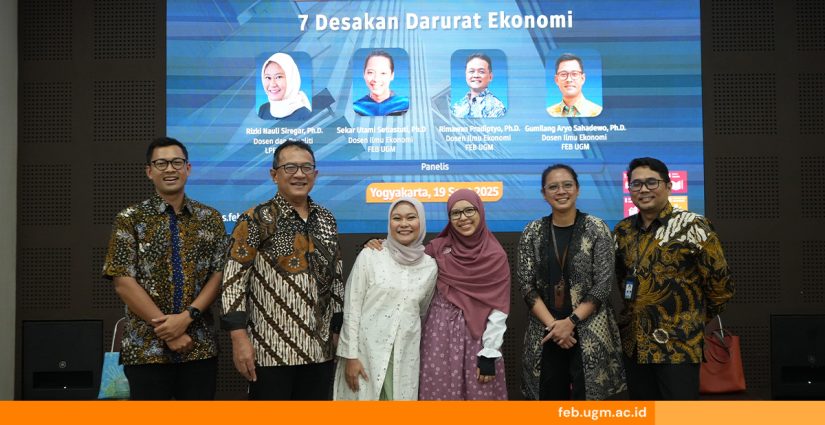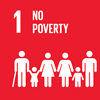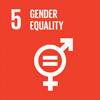
The Equitable Transformation for Alleviating Poverty and Inequality Working Groups FEB UGM collaborated with the Indonesian Economists Alliance (AEI) to hold a public discussion entitled Seven Urgent Economic Demands on Friday (19/9/2025) at the Faculty of Economics and Business, Gadjah Mada University. This discussion was held to discuss various strategic efforts facing increasingly complex national economic conditions.
Economist and lecturer at FEB UI, Rizki Nauli Siregar, Ph.D., stated that these seven urgent economic demands were presented due to concerns about the nation’s current state, with increasing social inequality among the lower-middle class. Although economic growth has been stable at around 5 per cent since 2022, the quality and inclusiveness of this growth have actually declined. Real wages have stagnated, rising by only 1.2 percent, while the creation of quality jobs has steadily declined. Since 2018, 80 percent of new jobs have been concentrated in home-based enterprises, where average wages remain below the national level. As a result, the welfare of the middle and lower classes has stagnated, while the upper classes have expanded rapidly. Other serious issues, such as illegal levies, the rise of online gambling that worsens the economic situation of vulnerable groups, and various violations of citizens’ rights, have further deepened this inequality.
Nevertheless, Rizki stressed that these issues did not arise overnight, but are the accumulation of long-standing failures in governance that have eroded fairness within society.
“As economists, we feel a shared responsibility to voice out what people are experiencing,” Rizki affirmed.
In response to these challenges, AEI formulated seven core demands. First, improving budget governance fairly and proportionally. Second, restoring the independence and transparency of state institutions. Third, curbing excessive state dominance that suppresses local economies. Fourth, reducing bureaucratic hurdles that hinder investment. Fifth, prioritizing policies that directly address inequality. Sixth, reviving evidence-based policymaking. Seventh, strengthening institutional quality to restore public trust and safeguard democracy.
Economist and Lecturer at the Faculty of Economics and Business, Gadjah Mada University, Elan Satriawan, Ph.D., emphasised that the seven urgent economic demands were not technical recommendations ready to be implemented, but rather a movement to push for change. He explained that several issues lay beyond the economists’ capacity and required collaboration with government institutions that better understood on-the-ground conditions. Nevertheless, the issues raised, such as the lack of independence among state institutions, have been shown to impact economic growth directly.
“Institutional problems are, in fact, a crucial instrument for advancing the economy. The hope is that the government will heed these demands and take action. Only then can we join forces and collaborate with others to formulate more concrete recommendations,” he explained.
He added that there is still considerable hope for progress under the new administration, which has not yet completed its first year in office. According to him, although these problems cannot be resolved in the short term, the reforms will allow improvements to become evident in the upcoming years.
Meanwhile, Lecturer at the Economics Study Programme, Faculty of Economics and Business, Gadjah Mada University, Sekar Utami Setiastuti, Ph.D., highlighted the stagnation of Indonesia’s tax ratio. She noted that this situation was influenced by the imbalance between economic growth and taxable sectors, particularly given the dominance of the informal sector in the national economy. Moreover, the many tax incentives offered to attract investment have increased the government’s expenditure burden. For this reason, she stressed the need for a long-term strategy to ensure that state revenue grows in line with government spending.
Addressing one of the demands related to institutional transparency, Lecturer in the Economics Study Programme, Faculty of Economics and Business, Gadjah Mada University, Gumilang Aryo Sahadewo, Ph.D., raised concerns over the lack of clarity in the last quarter’s economic forecasts released by Statistics Indonesia (BPS). He observed that the results differed significantly from those of the previous quarter. In fact, economic projections made by institutions and economists are usually not far off from BPS figures. “What is striking is the discrepancy between the forecasts in the last quarter and the previous one. Institutions and fellow economists normally have projections that are not far from BPS. So, whether many new indicators were not disclosed beforehand, so that it causes such a difference still remains unclear,” Gumilang remarked.
Moreover, Coordinator EQUITAS FEB UGM, Wisnu Setiadi Nugroho, Ph.D., emphasized that these demands are not merely the voices of a select few but rather the result of a collective effort involving 415 AEI members and supported by 241 non-economists. AEI hopes to garner broader public sympathy and support through platforms like this. An open call for endorsement has also been made available through bit.ly/dukungdesakandaruratekon.
Reportage by: Najwah Ariella Puteri
Editor: Kurnia Ekaptiningrum
Sustainable Development Goals












